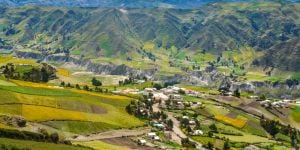español for Gringos
Subscribe to the topic
Post new topic
j600rr wrote:cccmedia wrote:Un caballo entra en una cantina.
El cantinero dice, "Porque tan larga cara..."
Minor point of contention. Believe it should be por qué in the example you gave no?...
Por Qué, porque, pretty much same word and pronunciation, but two different meanings.
Yes, the bartender in the joke should have been saying "Por que," meaning why, and not "Porque," meaning because).
(To the horse it all sounded the same.)
ANOTHER good catch, folks.
cccmedia in Quito
cccmedia wrote:Today's practicum: see how quickly you pick up on this brief joke in espanol (translated from English). If you need a "cheat sheet," it's below.*
Un caballo entra en una cantina.
El cantinero dice, "Porque tan larga cara..."
*caballo is horse, cara is face
Thought it was a dirty joke.
RE: the the double L pronounced like "J"...Is that a difference of Ecudorian Spanish?
suefrankdahl wrote:RE: the the double L pronounced like "J"...Is that a difference of Ecudorian Spanish?
It's true of most forms of Spanish that I'm aware of -- certainly the Mexican version.
It has even spilled over into Tagalog and maybe other languages spoken in the Philippines.
BobH wrote:suefrankdahl wrote:RE: the the double L pronounced like "J"...Is that a difference of Ecudorian Spanish?
It's true of most forms of Spanish that I'm aware of -- certainly the Mexican version.
It has even spilled over into Tagalog and maybe other languages spoken in the Philippines.
The island next to Corregidor in Manila Bay is Caballo, meaning horse, and I heard it pronounced as a Y, cabayo, from the 16th century Spanish. Currently Caballo is housing the peacekeepers just returned from Liberia for their 21 day isolation..
BobH wrote:suefrankdahl wrote:RE: the the double L pronounced like "J"...Is that a difference of Ecudorian Spanish?
It's true of most forms of Spanish that I'm aware of -- certainly the Mexican version.
It has even spilled over into Tagalog and maybe other languages spoken in the Philippines.
Guess it depends on what country you are in. My experience has been opposite of Bob's (not saying either one of us is right or wrong).
At any rate it's not a big deal. If the people seem to be using the "J" where you are, then use that. If they use the "Y", then use that. You should be able to distinguish pretty easily, and make the adjustment.
j600rr wrote:Cuantos anos tiene? How old are you
Actually not using the ñ makes it an entirely different question. ie, How many anuses do you have? I have seen on some sites (used by Spanish speakers) where they use ny when there is no ñ on the keyboard.
quito0819 wrote:j600rr wrote:Cuantos anos tiene? How old are you
Actually not using the ñ makes it an entirely different question. ie, How many anuses do you have? I have seen on some sites (used by Spanish speakers) where they use ny when there is no ñ on the keyboard.
HeHe, well I said 39. Guess I'm just more special than most, but point taken.
j600rr wrote:Have discovered that a lot of nouns ending in ma, ta, or pa are masculine because they are from Greek origin.
(el programa, el drama, el idioma, el tema, el clima, el sistema)
We earlier discussed the rare feminine exceptions -- fem. words ending in "o," without mentioning the most commonly used word in this category:
mano (hand).
Las manos limpias = the clean hands
In Gringolandias worldwide "mano" is used most commonly in the mixed-language phrase "going mano a mano," usually meant as a face-to-face competition. I'm guessing some Gringos think it literally means man-to-man.
The original meaning seems to have been different. The lone definition of "mano a mano" at wordreference.com is "hand in hand."
cccmedia in Quito
cccmedia wrote:In Gringolandias worldwide "mano" is used most commonly in the mixed-language phrase "going mano a mano,"
"Mano" got big play in the movies when the Sundance Kid (Robert Redford) tried to read off a Spanish memory card to pull off a bank robbery in Bolivia.
By the time the Kid could spit out the phrase "manos arriba" -- stick 'em up -- Butch Cassidy (Paul Newman) pointed out: "They GOT 'em up. Skip on down (the card)"...
Sundance Kid: "Todos ustedes arrismense.*"
Butch Cassidy: "They're against the wall already."
Sundance Kid: "Ah, you're so smart, you read it."
*There is no such word as "arrismense," "arrismar" or any verb close to that at wordreference.com ...
cccmedia in Quito
cccmedia,
"*There is no such word as "arrismense," "arrismar" or any verb close to that at wordreference.com ..."
Perhaps (from Spanishdict.com):
arriscar
transitive verb
to risk
pronominal verb
arriscarse to take a risk
arriscar
transitive verb
(And) (S. Cone) (México) (doblar) to turn up; fold up; tuck up; (encrespar) to stiffen; [+nariz] to wrinkle;
intransitive verb
1 (And) (enderezarse) to draw o.s. up; straighten up
And: (same source)
Verb Conjugations for arriscar
Gerund: arriscando
Participle: arriscado
The irregular conjugations of this verb are in red.
Indicative
Present Preterit Imperfect Conditional Future
yo arrisco arrisqué arriscaba arriscaría arriscaré
tú arriscas arriscaste arriscabas arriscarías arriscarás
él/ella/Ud. arrisca arriscó arriscaba arriscaría arriscará
nosotros arriscamos arriscamos arriscábamos arriscaríamos arriscaremos
vosotros arriscáis arriscasteis arriscabais arriscaríais arriscaréis
ellos/ellas/Uds. arriscan arriscaron arriscaban arriscarían arriscarán
I promise you this is a true story. When I was a young border patrol agent (long time ago), I had a fellow brand new patrol agent friend, Mikie, from Arkansas. One night while interviewing a group we had caught, Mikie was asking a guy "Cuantos anos tiene?" Now, the word "Ano" with a tilde over the N is a lot different than the word "Ano" without a tilde. I won't say what Ano without the tilde means, because I don't know how sensitive the moderator staff is here.  Go google it.
Go google it.
Anyhow, Mikie kept trying to ask the guy how old he was (he thought) and the guy, looking very confused, kept holding up one finger and replying "uno?" All of us in the room kept cracking up, and Mikie was getting madder thinking we were laughing because he thought the guy was being a smart alec by saying he was 1 year old. So Mikie would get even louder, "CUANTOS ANOS TIENE?" I didn't know whether to feel more sorry for Mikie or the little peasant Guatemalan farmer who thought Mikie was asking him something different.
And another interesting thing about Spanish, every country has their own version of Spanish. Just like the English speaking world does. Ever talked to a Jamaican or a Cockney Brit and have no idea what they're saying? Same thing in Spanish. And trying to decipher all the dialects in another language can be very difficult. I had good luck understanding the Ecuadorans, but as soon as I crossed the border into Colombia, I couldn't understand much of anything.
And each country has their own word for hangover. The universal Spanish word for hangover is "resaca," yet no one seems to use it. In Ecuador, it's Chuchaqui, which is an indian word. Colombians say "Guayabo" and apparently you should say the word as if you have a mouth full of marbles. I didn't know what they were asking for about a month (and yes, I drink a few beers here and there). I'd ask them to spell it, and they'd shrug and say hell I dunno. I'd ask if they meant "resaca" and they'd say, "Si, una resaca." Then why didn't you just say so?
So, it can be very fun and also aggravating to learn Spanish when every country has their own version. But in English we do it, too, right? If an Englishman told you to go look for something in "the boot" would you know what that is? 
BrandonBP wrote:I didn't know whether to feel more sorry for Mikie or the little peasant Guatemalan farmer who thought Mikie was asking him something different.
Good stuff, Brandon. The ano-ano story cracked me up.
You really get it about sharing your experience and insights on this thread called "espanol for Gringos: No Heavy Lifting."
If anyone still feels compelled to put up multiple posts to list 97 conjugations and the "pronominal" form of a little-used Spanish verb, please consider starting a new thread under the heading "Heavy Lifting."
cccmedia in Quito
The correct name of the group should be, "Español for Gringos". It should begin with a cap "E" and to be correct must in include the "ñ", All accents needed for Español can be found in ASCII files. Just Google "ASCII" for the number codes. You hold down the "Alt" key and hit the numbers on you "number pad" to the right. Not possible on some lap tops.
Alt plus the following numbers produce the following symbolizes ...
130 - é
160 - á
141 - ì
149 - ò
163 - ú
164 - ñ
165 - Ñ
167 - º (98ºF)
168 - ¿
173 - ¡
There are over 100 others
Regards, Tom aka Don Chema
'
Keltic Tom wrote:The correct name of the group should be, "Español for Gringos". It should begin with a cap "E"...
False. This is completely incorrect.
You claimed on various Expat.com threads that you lived in Mexico, so you should know that the names of all languages -- including espanol --
do not start with capital letters. Nor do the names of months, days of the week, nor religions.
All of the above are lower case except in instances where all capital letters are used, for instance, signage.
"Spanish uses significantly fewer capital letters than does English....
"Names of languages aren't capitalised. 'Hablo ingles.' I speak English. 'Quiero estudiar aleman.' I want to study German."
(spanish.about.com)
So it's "espanol for Gringos."
Add the tilde if you want to and can.
cccmedia in Quito
Keltic Tom wrote:The correct name of the group should be, "Español for Gringos". It should begin with a cap "E" and to be correct must in include the "ñ", All accents needed for Español can be found in ASCII files. Just Google "ASCII" for the number codes. You hold down the "Alt" key and hit the numbers on you "number pad" to the right. Not possible on some lap tops.
Alt plus the following numbers produce the following symbolizes ...
130 - é
160 - á
141 - ì
149 - ò
163 - ú
164 - ñ
165 - Ñ
167 - º (98ºF)
168 - ¿
173 - ¡
There are over 100 others.
As you said, this system doesn't work on all laptops. Mine, for instance.
Even if it does work on other computers, this thread is about "espanol for Gringos: No Heavy Lifting." Stopping every third word to enter a code -- let alone over 100 possible codes -- is Heavy Lifting.
Earlier on this thread, after I pointed this out to you before, other posters discovered and posted ways to add the accent marks, tildes, umlauts, upside down marks, etc....ways that don't involve having to type in a code every few words.
For instance, how to switch from an English keyboard to a Spanish one.
Or that Dell sells computers with a built-in Spanish keyboard option.
The point of this thread is to make espanol easier, more accessible and more enjoyable for Gringos...and to improve our espanol along the way, of course.
cccmedia in Quito
¿And what about the " ñ "?
What pray tell is castellano?
Don Chema
BrandonBP wrote:And another interesting thing about Spanish, every country has their own version of Spanish. Just like the English speaking world does. Ever talked to a Jamaican or a Cockney Brit and have no idea what they're saying? Same thing in Spanish. And trying to decipher all the dialects in another language can be very difficult. I had good luck understanding the Ecuadorans, but as soon as I crossed the border into Colombia, I couldn't understand much of anything.
And each country has their own word for hangover. The universal Spanish word for hangover is "resaca," yet no one seems to use it. In Ecuador, it's Chuchaqui, which is an indian word. Colombians say "Guayabo" and apparently you should say the word as if you have a mouth full of marbles. I didn't know what they were asking for about a month (and yes, I drink a few beers here and there). I'd ask them to spell it, and they'd shrug and say hell I dunno. I'd ask if they meant "resaca" and they'd say, "Si, una resaca." Then why didn't you just say so?
So, it can be very fun and also aggravating to learn Spanish when every country has their own version. But in English we do it, too, right? If an Englishman told you to go look for something in "the boot" would you know what that is?
All the above is so true. I learned most of my Spanish in the Guanacaste Province of Costa Rica in a small town. Any time I go to any Spanish speaking country it usually takes me a little while to understand, and comprehend anything but basic simple phrases. Am used to the version of Spanish, and the quirks that I learned from living in a small town.
For example my now property in Panama is in a small town, and it's really tough to pick up the Spanish there. In my defense, a lady I know who lives in that area is Colombian, grew up in Colombia, and is obviously fluent in Spanish, and even she has to often ask the locals to repeat themselves, and usually walks away shaking her head.
j600rr wrote:For example my now property in Panama is in a small town, and it's really tough to pick up the Spanish there. In my defense, a lady I know who lives in that area is Colombian, grew up in Colombia, and is obviously fluent in Spanish, and even she has to often ask the locals to repeat themselves, and usually walks away shaking her head.
Okay, here's another light-hearted Spanish story. I traveled to Panama on business with an older fellow, Panamanian-American. We were in Panama City and he got in touch with his old buddies from high school. They were all a bunch of funny old men. What a bunch!
So, we're at the horse tracks betting on the horses and drinking all day. It's so damn hot. God it was hot. And we're drinking that sugar liquor with milk. It sounds horrible that liquor might go with milk, but it was quite refreshing. I am drinking beers, shots, and sugarcane with milk like you wouldn't believe. And having a fabulous time with these old men. We drink all night, and I can't understand a damn thing these Panamanian men are telling me. My Spanish isn't bad, but I couldn't hear even a single word or what they were saying. They spoke English, too, and said their Panamanian dialect was called Chumbo. Well I can't understand Chumbo at all.
The next day on the plane back home, I told my work partner that I really liked his friends and that I'd had a marvelous time. I said, "Man, did you know that your friends bought me drinks ALL DAY and ALL NIGHT? Those guys were super great!" He started laughing and was clapping and thought the whole thing was hilarious. So I was baffled as to why he was so tickled.
He said, "Do you know why they bought you so many drinks?"
Me: "Because they liked me?"
Him: "Well, yes that too. But they saw you pounding those drinks and when you went to the bathroom they had made a bet as to how many drinks it would take you to pass out. One guy bet 6, another said 12, next was 18, and one guy even said 'I have faith in this kid; I've seen him drink, and I say 25 drinks.'" The closest one was to win the pot.
So nobody won. I apparently went way above and beyond 25 drinks and they were all amazed. So, at this point I was sort of disappointed that they didn't really enjoy my company but had just had fun with me. But I was wrong. A couple of weeks after that, I got a card in the mail in Atlanta signed by all of them saying how much they enjoyed meeting me and wanted me to come back down. I thought that was really great and will remember those guys forever on.
I don't know what sort of life you live in Panama, j600rr, but I can only imagine that it's very great if those people are like the guys I met. 
BrandonBP wrote:I don't know what sort of life you live in Panama, j600rr, but I can only imagine that it's very great if those people are like the guys I met.
Not currently in Panama. I go back and forth from the states a lot. Actually also spend a good deal of time in Dominican Republic, which probably isn't high on most peoples list, but I enjoy it. Will probably eventually build in Panama, but for now am happy not being tied down with any major investment, and the ability to travel pretty freely as I like. Actually only came to Ecuador for my sisters wedding, but have been visiting more frequently, because I really like Ecuador. Still haven't hit Salinas, and Bahia, but that's next on my list.
Yeah it ain't a bad life.
Ok, don't want to get off topic and reprimanded by CCC.
j600rr wrote:]I really like Ecuador. Still haven't hit Salinas, and Bahia, but that's next on my list.
I didn't try those spots, either. I was in Quito for 3 weeks, Cuenca for 3 weeks, and spent 7 weeks in Banos. God amighty Banos. I love that place like it's my own private paradise. I'm not a violent or criminal man. I've never killed a person or
stolen anything in my life. But if I could do anything to live in Banos... well, I might just do anything. What a wonderful place.
ccc
"espanol for Gringos (No Heavy Lifting)"
The sentence has 6 words ... 5 of them are in English and one is Español.
Is the sentence English or Español? Majority rules so we will consider it to be English and therefore English rules shall apply. Why does gringos have a cap " G "? Why does espanol have an " e " and why is it missing the " ñ "?
What is castillano?
Don Chema
While the LL is occasionally pronounced as a Spanish J and often like a the French "je", many Cuencanos pronounce it as a Y, like pollo which sounds like poi-o or poy-o.
Keltic Tom wrote:ccc
"espanol for Gringos (No Heavy Lifting)"
The sentence has 6 words ... 5 of them are in English and one is Español.
Is the sentence English or Español? Majority rules so we will consider it to be English and therefore English rules shall apply. Why does gringos have a cap " G "? Why does espanol have an " e " and why is it missing the " ñ "?
What is castillano?
"espanol for Gringos (No Heavy Lifting)" is a thread title, not a sentence.
English rules do not apply to words in espanol that appear in a mostly English phrase or sentence.
Expat.com is a blog for Expats and IMO Gringos. You'll notice that "Expat" begins with a capital letter, for instance, in the search box at the extreme top of the page, so we may honor the form presented by the Blog when spelling Expat...and by extension, also start Gringo with a cap.
A few posts ago I explained why "espanol" starts with an "e": because all languages are spelled with lower case in espanol, unlike in English.
When I stated that the accent marks including tilde (mark above the n) are not available on my keyboard, that explained why it does not appear in my spelling of espanol.
cccmedia in Quito
The meaning of castillano...
This is a form or dialect of the language that developed in a vaguely defined area of northern and central Spain and is spoken by some or most people in that area or by folks whose families migrated from that area.
Possibly the most well-known difference in castillano is the pronunciation of the double L.
Detailed discussion of castillano can be found via Internet search, and IMO is not directly relevant to this "No Heavy Lifting" thread.
cccmedia in Quito
PEI Red wrote:While the LL is occasionally pronounced as a Spanish J and often like a the French "je", many Cuencanos pronounce it as a Y, like pollo which sounds like poi-o or poy-o.
Yes, that also makes everything confusing when trying to learn another language. The LL in Castilian is pronounced like a "Y" but in Colombia it's a "J." So "Medellin" is pronounced "Medejeen." The Argentinians pronounce it like a "sh," so they will ask you "Como te shamas?" when asking your name. A real mess when you've learned college Spanish. 
But again, we have the same in English. A Bostonian may refer to "lar enforcement." A Scotsman make say, "Fekkin shite!" lol that's one of my faves.
BrandonBP wrote:But again, we have the same in English. A Bostonian may refer to "lar enforcement." A Scotsman make say, "Fekkin shite!" lol that's one of my faves.
I love it.
I thought the castillian thing was too dry and too much heavy lifting for this thread, but Brandon showed that a true raconteur can pull it off.
The above quotation shows the kind of banter that prompted those Spanish-speaking guys in the "cantina" to buy Brandon drinks all night, send him a postcard weeks later, and (possibly) erect a statue in his honor.
cccmedia in Quito
F&kkin Sh#te*, Domino's put "aceitunas" on my veggie slices again.
*Said in a Scottish brogue, it roughly translates as:
"Holy 'fajitas,' Batman...."
cccmedia wrote:F&kkin Sh#te*, Domino's put "aceitunas" on my veggie slices again.
*Said in a Scottish brogue, it roughly translates as:
"Holy 'fajitas,' Batman...."
I hate to stereotype, but don't all Scots sound like Fat Bastard from Austin Powers? They're so loud and are always so angry. I find them to be hilarious.
As long as we are talking about the "LL" pronunciation, and how different regions say it differently. Spain pronounces the soft "c" and "z" as "th". Think they are the only country to pronounce it that way, but not sure?
BrandonBP wrote:I hate to stereotype, but don't all Scots sound like Fat Bastard from Austin Powers? They're so loud and are always so angry. I find them to be hilarious.
F&kkin Sh#te, Brandon, don't get all politically incorrect on me on this "espanol for Gringos" thread, what with the Home Office already closely monitoring our cussing from their listening post in Mauritius.
In an attempt to divert you to a more productive activity, I've created a new Expat.com thread called "What We Think of the Cops in Ecuador" and have re-posted over there some of your compelling commentary about "la policia"...
cccmedia in Quito
It looks like it's been encrypted. Not to worry
Here are five of the phrases you'll want to know or understand in Ecuador:
Excuse me.....................................................Con permiso
I usually pay (X$$)..................................Suelo pagar (X$$)
I'm looking for the Chinese restaurant........Busco la chifa.
I'm sorry..........................................................Lo siento.
Is there someone who can help me...Hay alguien que puede ayudarme...
*Chifa is just an example. The point is that the verb "buscar" (pronounced boose-CAR) means "to look for..."
cccmedia in Quito
suefrankdahl wrote:Ultimately, speaking and comprehension are the first thing I like to master.
Which brings us to the important topic of telling time.
Time is "tiempo" in espanol, but as mentioned above, "tiempo" also means "weather."
Ipso facto, Ecuadorians don't say, "Que tiempo es..." when asking you what time it says on your watch.
They say, "Que hora es" (literally, what hour is...) Notice that the irregular verb (for "to be") "ser" is used, not "estar," in telling time.
Unless it's exactly noon or midnight, or between one and two o'clock, you would usually answer in "hours," not "hour"...
Son las tres. It's three o'clock.<Literally, "There are the three" (hours).>
Son las once. (OWN-say) It's eleven o'clock.
Es la una. It's one o'clock.
Shall we expand...
Es la una y media. It's half past one.
Son las cinco y quince. It's 5:15.
Es mediodia. It's noon.
Es medianoche. It's midnight.
Son las nueve falta veinte. It's 20 before nine.
cccmedia in Quito
MByerly wrote:My old brain can handle only so much...please, don't confuse the already confused.
Are ya feelin' angry or upset...
Here are examples on how to use a couple of words that could be handy...
porqueria (pawr-keh-REE-ah): filth, garbage, that having to do with a pig
Example: As you prepare to leave his vehicle, a taxista tries to charge you two dollars above the pre-negotiated price for a ten-minute cab ride (claiming there was too much traffic, it was hard to find your address, missed his lunch, etc.)...
You: "Que porqueria. No es justo. Usted dijo tres dolares."
What BS. That's not fair. You said three bucks.
---
maldito: (adjective) damned, cursed...(noun) cursed one...(the verb "maldecir" means to curse).
Example: Two troublemakers try to rob you.
You (loudly): "Socorro, los malditos estan atacandome..."
Help! The M-----F-----s are attacking me!
cccmedia wrote:maldito: (adjective) damned, cursed...(noun) cursed one...(the verb "maldecir" means to curse).
Example: Two troublemakers try to rob you.
You (loudly): "Socorro, los malditos estan atacandome..."
Help! The M-----F-----s are attacking me!
After a number of years of inactivity, the Philippines recently decided to resurrect their Women's National Soccer Team -- with most of the team being Fil-Ams (my daughter was invited to a tryout).
There was a bit of controversy when they decided to name the team 'the Malditas'.
Pilipino draws many of its words from Spanish, but often with slight changes in meaning. I believe Maldita there means witch, but I'm not sure.
BobH wrote:the Philippines recently decided to resurrect their Women's National Soccer Team...
There was a bit of controversy when they decided to name the team 'the Malditas'.
If I came across a team of that name, I would translate it as the "Bad Girls" or the "Toughs."
cccmedia in Quito
cccmedia wrote:Wordreference.com is my favorite website for finding definitions.
Soccer aka "futbol" is the big sport in Ecuador, but over 90 percent of the NFL's football games are televised here in Quito over DirecTV, as well, many with audio available in Spanish as well as English.
You don't have to be a sports fan to say the NFL team names the way the South American sportscasters do, but to know and say them you may need to have studied espanol.
See how well you can do with the Spanish-language names for ten NFL teams. The original version of each name is on the left....
The Bears Los Osos
The Cowboys Los Vaqueros
The Giants Los Gigantes
The Patriots Los Patriotas
The Eagles Los Aguilas*
The Ravens Los Cuervos
The Lions Los Leones
The Rams Los Carneros
The Falcons Los Halcones
The Chiefs Los Jefes
*Aguilas, pronounced AH-ghee-las
cccmedia in Quito
Articles to help you in your expat project in Ecuador
 Spanish Can Be Easy
Spanish Can Be EasyForeign languages have always caused me a bit of anxiety... Heck, my english is a little suspect sometimes. I ...
 Study in Ecuador
Study in EcuadorNeed to learn Spanish? Want to attend a high school, a university, or trade school in the Andes? Come to Ecuador ...
 Food in Ecuador
Food in EcuadorWhat kind of food will you find in restaurants, cafes, and private homes in Ecuador? Many restaurants in Ecuador ...
 Work in Ecuador
Work in EcuadorEcuador is famous as a retirement haven. But you might not want to wait until retirement age to move there and ...
 Healthcare in Ecuador
Healthcare in EcuadorEcuador, as a fast-developing nation, has laws that are constantly evolving, but one thing is certain: the ongoing ...
 Opening a bank account in Ecuador
Opening a bank account in EcuadorA few years back, an expat would just breeze into an Ecuadorian bank, flash their passport and a bank account ...
 Family and children in Ecuador
Family and children in EcuadorFamily is everything to an Ecuadorian. The extended family unit is the most important aspect of life in Ecuador, ...
 The Working Holiday Visa for Ecuador
The Working Holiday Visa for EcuadorEcuador is truly a paradise for adventure and nature lovers, and thanks to the Working Holiday Visa program, they ...
Find more topics on the Ecuador forum



